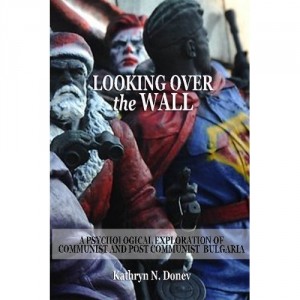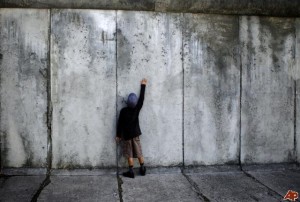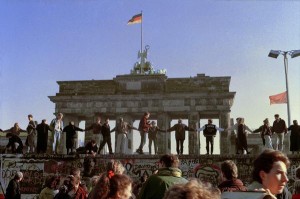35 Years Since the Fall of the Berlin Wall
The Berlin Wall in our Minds
Europe is celebrating the 35th anniversary from the Fall of the Berlin Wall – an event that has changed forever the course of modern history. For us it was more than a miracle to see how people gathered together free from fear of persecution to celebrate the Resurrected Christ. It almost seemed like they celebrated their own resurrection, the resurrection of the Bulgarian Church of God, from the years of trials and persecutions under the Communist Regime.
But 35 years after its fall, the Berlin Wall still stands tall in the eastern European mindset. This is especially true for the country of Bulgaria and the evangelical churches operating on its territory. The Bulgarian Pentecostal Movement has experienced more structural and leadership difficulties in the past decade, than they have in their almost centennial existence. The post-totalitarian model of church leadership had a destructive aftereffect on the two major wings of the movement, as the historically more independent Bulgarian Church of God has experienced a series of biannual splits in the past six years, while the Assemblies of God represented in Bulgaria by the Pentecostal Union Churches is undergoing leadership changes which will leave their mark on its identity as a movement.
The context of ministry is becoming even more accelerant in light of the first 100 days of the new center-rightist Bulgarian government, proposing even newer changes in the religious laws of the country which will limit the government registration only to churches who can prove a membership over 5,000 people. This limit may become unreachable as many church members are among the 4 million Bulgarians who in the past decade have left the country in search of work and a better life and now reside in Western Europe or the United States. If such legal change indeed occurs, more red tape is coming in Bulgaria against the preaching of the Gospel, religious education and faith as a whole, which will be put under the authority of a government religious council upon the recommendation of the European Union and after the Eastern Orthodox monopolistic paradigm of the Russian Federation.
The three local church models which comprise the Bulgarian Evangelical Movement are not ready to face this new brutal attack against their religious freedom. The small village churches, led mostly by mission representatives sent by larger church communities, often waver between different denominations, which results to doubling and some times tripling their registrations thus becoming an easy first target to any new government restrictions.
Over half of the midsize city churches (70-95 members) have emerged after a church split, which has remained as an unfortunate part of their identity, which reoccurs in their life and ministry. This process is valid in both Bulgarian and other ethnic communities in the country with an emphasis on the Roma Gipsy churches. The result is more small and weakened churches or even home group communities who never undergo normal church growth, thus remaining distant from the outside religious life and often closing themselves to a strangely sectarian existence.
Finally, a few nondenominational churches have retained their own evangelical identity leaving the mainstream denominations and continue to build relationships with sponsoring religious organizations outside of Bulgaria. Having gained financial and leadership independency, they have been successful to complete their building projects and enjoy temporary autonomy. Thus, a dozen of large Bulgarian congregations with several hundred in attendance, located in the capital Sofia, the Danube River city of Rousse, the Black Sea ports of Bourgas and Varna and the industrial towns of Plovdiv and Stara Zagora, have undertaken building projects perhaps as more of a business opportunity. But the aftereffect of their bi-decadal efforts, have shifted their focus from ministry toward building ministry centers and have left their financial resources drained and their supporters demotivated in the midst of global economic crises. And so the Wall remains in the mindset and the crises within the identity of the Bulgarian evangelical believer.
Some three and a half decades ago at the Berlin Wall, President Reagan turned to Soviet Prime Minister Michael Gorbachev with the words: “Tear this wall down …” But Gorbachev cannot help tear down the Wall in our minds. This part of the liberation of the human spirit, mind and soul still remains in the perimeter of God’s grace for human salvation. The answer for global crises lies in the spiritual laws set by God in the Bible that still stands strong as the standard for living. And most important of all: the focus of the Bulgarian Church must remain not in building projects or church split competitions, but in the Spirit given mission of salvation of eternal human souls. Pray for BULGARIA.
The Nehemiah Experience: Devil, did you hear, I done built the wall!
2018 Revival Harvest Campaign: The Nehemiah Experience
Nehemiah 1: Who cries, fasts and prays for the desolated church?
Nehemiah 2: Dear, devil, I am back!
Nehemiah 3: 12 gates of Jerusalem
Nehemiah 4: Devil, did you hear, I done built the wall…
(1)Time to enter through the Door
(2) Time for junk no more
(3) Time to wage war
Calling on the Nehemiah Generation
Strangers will come in the Church
And the walls need to be fortified…
Looking Over the Wall (now on Kindle)
 Looking Over the Wall: A Psychological Exploration of Communist and Post Communist Bulgaria
Looking Over the Wall: A Psychological Exploration of Communist and Post Communist Bulgaria
This book is the result of over a decade of research and personal experiences of living in Bulgaria for the past seven years. It embodies documents, articles, personal interviews and essays dealing with psychological explorations of communist and post communist Bulgaria. Along with a historical overview of Bulgaria, the author presents the development of psychotherapy throughout the country and addresses future concerns for the state of counseling within a post communist context. Furthermore, the author examines the Pentecostal experience of the Bulgarian evangelical believer drawing on a paper presented at the 36th annual Society of Pentecostal Studies Conference. As well included is original research which develops a theoretical account of the sequences of internal motivation in addition to student survey results regarding counseling practices from the first Master’s in Chaplaincy Ministry Program in Europe at the Bulgarian Evangelical Theological Institute.
Get your Kindle copy today at: Amazon Kindle Store
Bulgaria Puts Up a Migrant Wall at its Border
New York Times – YAMBOL, Bulgaria — Less than two decades after the painstaking removal of a massive border fence designed to keep people in, Bulgarian authorities are just as painstakingly building a new fence along the rugged Turkish border, this time to keep people out.
Faced with a surge of refugees from the Middle East and North Africa — and the risk that they include jihadis intent on terrorist attacks — Europe is bolstering its defenses on many fronts, including this formerly Communist country, which little more than a quarter-century ago was more concerned with stanching the outbound flow of its own citizens to freedom. For the past 16 months, Bulgaria has been carrying out a plan that would sound familiar to anyone along the United States-Mexico frontier: more border officers, new surveillance equipment and the first 20-mile section of its border fence, which was finished in September.
The hardening of the Bulgaria-Turkey border is one very visible manifestation of the agitation across the continent about the economic, social and political ramifications of the surge in immigration. With warmer weather fast approaching and more refugees likely to be on the move, nations along Europe’s southern tier are beefing up border staffing, adding sensors and other technical barriers, expanding refugee facilities, and building walls.
More than 200,000 refugees are known to have penetrated Europe’s land and sea borders last year, not including those who were able to sneak through undetected. And the numbers for the first two months of this year, when Europe enjoyed its second mild winter in a row, were up sharply compared with the same period last year.
Looking Over the Wall: A Psychological Exploration of Communist and Post Communist Bulgaria
 Looking Over the Wall: A Psychological Exploration of Communist and Post Communist Bulgaria
Looking Over the Wall: A Psychological Exploration of Communist and Post Communist Bulgaria
This book is the result of over a decade of research and personal experiences of living in Bulgaria for the past seven years. It embodies documents, articles, personal interviews and essays dealing with psychological explorations of communist and post communist Bulgaria. Along with a historical overview of Bulgaria, the author presents the development of psychotherapy throughout the country and addresses future concerns for the state of counseling within a post communist context. Furthermore, the author examines the Pentecostal experience of the Bulgarian evangelical believer drawing on a paper presented at the 36th annual Society of Pentecostal Studies Conference. As well included is original research which develops a theoretical account of the sequences of internal motivation in addition to student survey results regarding counseling practices from the first Master’s in Chaplaincy Ministry Program in Europe at the Bulgarian Evangelical Theological Institute.
Preview and Purchase Your Copy at Amazon.com
Thankful the Wall Came Down
 November 10, 2009 marked the 20 year anniversary of the fall of the Berlin Wall, which became a milestone to the fall of the communist regime in Eastern Europe. For those living under the regime, it was more than just a historical date of a physical structure falling. For those being persecuted for their faith, it was a spiritual wall of bondage that fell that day.
November 10, 2009 marked the 20 year anniversary of the fall of the Berlin Wall, which became a milestone to the fall of the communist regime in Eastern Europe. For those living under the regime, it was more than just a historical date of a physical structure falling. For those being persecuted for their faith, it was a spiritual wall of bondage that fell that day.
The fall of communism meant no longer having to be underground, no longer having to hide your faith, and no longer having to be in fear. Today, 20 years latter in this month of Thanksgiving, we are thankful to be able to live in a democratic Bulgaria where we can freely thank the Lord for His many blessings. We are thankful for church prayer meetings now being an open practice and the church being free to communicate with our Heavenly Father; for without communication there is no unification. In unity with Christ, we are stronger than any oppressive spirit.
We are thankful that we are unified with Christ under His hand of protection, in order that we may live out our purpose in life that we learn through Him. We find our direction through His Word and this Word brings freedom within and about us. We are thankful for this freedom in which we find purpose. With this purpose we find hope and with this hope we are able to fulfill the Heaving calling on our lives.
Happy Thanksgiving 2009 from all of us at Cup and Cross Ministries International in Bulgaria
The Berlin Wall in our Minds
 Europe is celebrating the 20th anniversary from the Fall of the Berlin Wall – an event that has changed forever the course of modern history. For us it was more than a miracle to see how people gathered together free from fear of persecution to celebrate the Resurrected Christ. It almost seemed like they celebrated their own resurrection, the resurrection of the Bulgarian Church of God, from the years of trials and persecutions under the Communist Regime.
Europe is celebrating the 20th anniversary from the Fall of the Berlin Wall – an event that has changed forever the course of modern history. For us it was more than a miracle to see how people gathered together free from fear of persecution to celebrate the Resurrected Christ. It almost seemed like they celebrated their own resurrection, the resurrection of the Bulgarian Church of God, from the years of trials and persecutions under the Communist Regime.
But 20 years after its fall, the Berlin Wall still stands tall in the eastern European mindset. This is especially true for the country of Bulgaria and the evangelical churches operating on its territory. The Bulgarian Pentecostal Movement has experienced more structural and leadership difficulties in the past decade, than they have in their almost centennial existence. The post-totalitarian model of church leadership had a destructive aftereffect on the two major wings of the movement, as the historically more independent Bulgarian Church of God has experienced a series of biannual splits in the past six years, while the Assemblies of God represented in Bulgaria by the Pentecostal Union Churches is undergoing leadership changes which will leave their mark on its identity as a movement.
The context of ministry is becoming even more accelerant in light of the first 100 days of the new center-rightist Bulgarian government, proposing even newer changes in the religious laws of the country which will limit the government registration only to churches who can prove a membership over 5,000 people. This limit may become unreachable as many church members are among the 4 million Bulgarians who in the past decade have left the country in search of work and a better life and now reside in Western Europe or the United States. If such legal change indeed occurs, more red tape is coming in Bulgaria against the preaching of the Gospel, religious education and faith as a whole, which will be put under the authority of a government religious council upon the recommendation of the European Union and after the Eastern Orthodox monopolistic paradigm of the Russian Federation.
The three local church models which comprise the Bulgarian Evangelical Movement are not ready to face this new brutal attack against their religious freedom. The small village churches, led mostly by mission representatives sent by larger church communities, often waver between different denominations, which results to doubling and some times tripling their registrations thus becoming an easy first target to any new government restrictions.
Over half of the midsize city churches (70-95 members) have emerged after a church split, which has remained as an unfortunate part of their identity, which reoccurs in their life and ministry. This process is valid in both Bulgarian and other ethnic communities in the country with an emphasis on the Roma Gipsy churches. The result is more small and weakened churches or even home group communities who never undergo normal church growth, thus remaining distant from the outside religious life and often closing themselves to a strangely sectarian existence.
Finally, a few nondenominational churches have retained their own evangelical identity leaving the mainstream denominations and continue to build relationships with sponsoring religious organizations outside of Bulgaria. Having gained financial and leadership independency, they have been successful to complete their building projects and enjoy temporary autonomy. Thus, a dozen of large Bulgarian congregations with several hundred in attendance, located in the capital Sofia, the Danube River city of Rousse, the Black Sea ports of Bourgas and Varna and the industrial towns of Plovdiv and Stara Zagora, have undertaken building projects perhaps as more of a business opportunity. But the aftereffect of their bi-decadal efforts, have shifted their focus from ministry toward building ministry centers and have left their financial resources drained and their supporters demotivated in the midst of global economic crises. And so the Wall remains in the mindset and the crises within the identity of the Bulgarian evangelical believer.
Some two decades ago at the Berlin Wall, President Reagan turned to Soviet Prime Minister Michael Gorbachev with the words: “Tear this wall down …” But Gorbachev cannot help tear down the Wall in our minds. This part of the liberation of the human spirit, mind and soul still remains in the perimeter of God’s grace for human salvation. The answer for global crises lies in the spiritual laws set by God in the Bible that still stands strong as the standard for living. And most important of all: the focus of the Bulgarian Church must remain not in building projects or church split competitions, but in the Spirit given mission of salvation of eternal human souls. Pray for BULGARIA.








